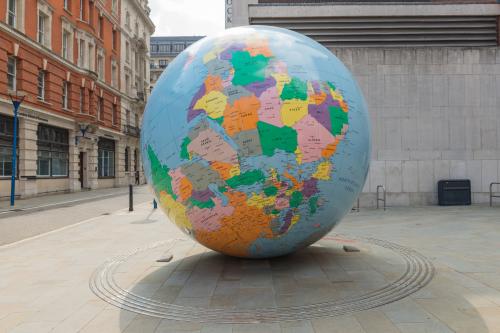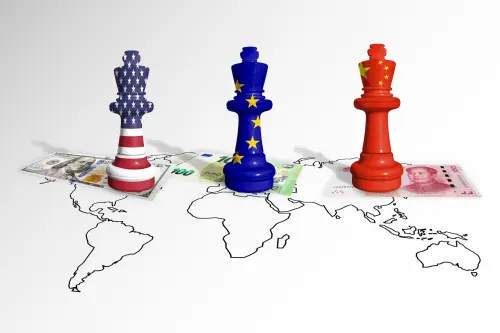China’s new leader President Xi Jinping has completed his foreign debut tour as the head of state after visiting Russia and three African countries: Tanzania, South Africa and the Republic of Congo. As the Chinese media hailed his “tremendous victory” and the “successful practice of great power diplomacy with Chinese characteristics”, the issue of China’s role and activities in Africa were once again put under the spotlight. Right before Xi embarked on his trip, Nigerian Central Bank Governor Lamido Sanusi criticized China’s engagement in Africa publicly in the Financial Times. His most quoted charge says “China takes from us primary goods and sells us manufactured ones. This was also the essence of colonialism.”
Sanusi’s comment cast a negative shadow to Xi’s first foreign visit and was met with ferocious rebuttals from an infuriated Beijing. China’s Ministry of Commerce pointed to the western countries’ “exploitation of African resources, trade of African people, occupation of African land and destruction of African culture” as the “essence of colonialism” and argued that it is China, not the West, that has provided support for Africa’s economic and social development. China’s Ministry of Foreign Affairs dispatched the head of its Africa Department, Lu Shaye, to deliver a formal demarche to a Hong Kong media outlet. He defended China’s role in Africa and argued that China has improved Africa’s international status by offering it a powerful alternative market and collaborator, delivering to Africa concrete benefits and treating it as an equal partner. In comparison, he argued, the West only “takes resources from Africa” and treats Africa with a condescending attitude.
The drastically diverging perceptions of China’s role in Africa are an interesting phenomenon. The polarization stems from the focus on different aspects of China’s activities on the continent. For example, dragon-slayers emphasize China’s selfish quest for African natural resources and how it sabotages international efforts to keep unpalatable African regimes in check. On the other hand, panda-huggers applaud China’s contribution to Africa’s economic development through infrastructure projects and revenue creation.
Unfortunately, neither reflects the nuanced, mixed nature of what China means to Africa. China enjoys unique financial and political advantages in promoting Africa’s growth through vast financing with little or no strings attached. However, these short-term benefits should not form a cover-up for the potential long-term negative consequences associated with neglecting issues of governance, fairness and sustainability.
On the positive side, China’s economic engagement in Africa has created significant benefits for African countries. Most importantly, Beijing has considerable capacity and willingness to provide financing to fuel Africa’s growth. During his recent trip, Xi reconfirmed China’s commitment to provide another $20 billion in financing to Africa. China usually attaches a significant amount of such funding to infrastructure projects, which forms the foundation for Africa’s industrialization and economic development. Many of these projects require large investment and long pay-back terms that traditional donors are reluctant to provide.
It is true that China does not emphasize the governance side of the story. This is a reflection of China’s own philosophy on the prioritization between economic development and political progress. Many Chinese officials, analysts and businessmen find the West’s overwhelming emphasis on democracy, governance, transparency in Africa amusing. To the West, they would ask an innocent but critical question: “for people who do not have food on the table, what’s the point of having democracy?” Using its own experience of subjugating political liberalization to the “higher cause” of economic development, China finds its approach to Africa as one that prioritizes the provision of basic elements of development, completely legitimate and fully justified.
In this way, China’s intention in Africa is benign. Beijing has no intention to colonize the continent, dictate the politics or economy of the local countries or deprive them of development opportunities. On the contrary, China truly sees itself as Africa’s “brother” and hopes to help African countries develop through infrastructure projects. Beijing seeks an approach different from that of the West, one that avoids the “meddling” with the internal affairs of African countries through conditional aid. In the last several years, China has contributed significantly to the economic growth of some of Africa’s poorest nations. China wants to see a prosperous Africa, which is beneficial to China’s interests as well.
However, this does not mean China is being altruistic. Helping Africa is important, but China would not do so if it had nothing to gain. Indeed, China emphasizes that any bilateral relationship has to be mutually beneficial. And China’s investment in Africa does pay itself back in multiple ways economically: development and exploitation of Africa’s natural resources, access to local market, employment opportunities for Chinese labors and service contracts for Chinese companies on infrastructure projects that China funds. When Chinese officials emphasize that China also invests substantially in countries that are not rich in natural resources to defuse international criticisms, they often forget to mention that China also has its eyes on other things that these countries can deliver, such as their support of Beijing’s “one China” policy, of China’s agenda at multilateral forums and of China as a “responsible stakeholder”. While there is nothing wrong with not being altruistic in one’s motives, it should be noted that China is not helping Africa in exchange for nothing.
In analyzing the nature of China’s activities in Africa, another important voice to examine is that of Africa itself. Many African countries and officials welcome China’s approach and fiercely defend China internationally. This seems like fairly powerful pushback to western criticisms of China’s role in Africa since African countries should know what they need more than anyone else. Africa’s approval of China poses an intriguing question for those in the West who disapprove of China’s activities in Africa: should the West reexamine its approach to Africa in order to better address what African countries truly need?
The Brookings Institution is committed to quality, independence, and impact.
We are supported by a diverse array of funders. In line with our values and policies, each Brookings publication represents the sole views of its author(s).



Commentary
China’s Increasing Interest in Africa: Benign but Hardly Altruistic
April 5, 2013